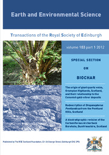
Earth and Environmental Science Transactions of the Royal Society of Edinburgh
Scope & Guideline
Bridging the gap between science and sustainability.
Introduction
Aims and Scopes
- Paleontology and Fossil Studies:
The journal frequently publishes research on paleontological discoveries, including new fossil species, anatomical reconstructions, and interpretations of ancient ecosystems. This focus helps to elucidate evolutionary processes and the history of biodiversity. - Geological and Geochemical Analyses:
Research on geological formations, sedimentary environments, and geochemical characteristics is a core area. This includes studies on the stratigraphy, tectonics, and geochemical processes that shape Earth’s crust and its resources. - Climate and Environmental Change:
The journal addresses issues related to climate change and environmental impacts through geological time, including the study of glacial and interglacial periods, and how these phenomena influence current climate dynamics. - Methodological Innovations:
A consistent focus on advancing methodologies, such as photogrammetry, palynology, and geochemical modeling, to enhance the accuracy and depth of geological and paleontological research. - Interdisciplinary Approaches:
The publication emphasizes interdisciplinary research that integrates geology, biology, chemistry, and environmental science, reflecting the complex interactions within Earth systems.
Trending and Emerging
- Climate Change Impacts and Adaptation:
There is an increasing emphasis on understanding the historical context of climate change and its effects on ecosystems, as well as studies that inform current adaptation strategies in response to ongoing environmental changes. - Technological Advances in Research Methodology:
The use of advanced technologies such as photogrammetry, digital reconstructions, and statistical modeling is on the rise, allowing for more detailed and accurate analyses of geological and paleontological data. - Interdisciplinary Environmental Research:
Emerging studies are increasingly integrating various scientific disciplines, such as geology, biology, and environmental science, to address complex problems like biodiversity loss and ecosystem changes. - Paleoecology and Ecosystem Dynamics:
Research focusing on ancient ecosystems and their dynamics, particularly how they relate to contemporary biodiversity and environmental challenges, is becoming more prominent. - Geochemical and Biogeochemical Processes:
There is a growing interest in the geochemical processes that affect environmental conditions, including studies on hydrocarbon migration, water quality, and the effects of pollutants, reflecting a broader concern for environmental health.
Declining or Waning
- Traditional Stratigraphy:
While still important, the frequency of traditional stratigraphic studies has declined in favor of more integrative approaches that combine stratigraphy with other geochemical and paleoenvironmental analyses. - Historical Perspectives on Individual Scientists:
The focus on biographical and historical studies of individual scientists, particularly those like James Croll, appears to be waning as the journal shifts back toward more research-oriented articles that emphasize current scientific findings. - Single-Discipline Studies:
Research that is narrowly focused within a single discipline (e.g., geology without integration of biology or environmental science) has become less common, as the journal increasingly favors interdisciplinary studies. - Case Studies with Limited Geographical Scope:
There seems to be a decline in case studies that focus on very localized geological features or fossil finds without broader implications, as the journal encourages studies with wider relevance to global issues.
Similar Journals

STRATIGRAPHY AND GEOLOGICAL CORRELATION
Connecting Geological Dots for a Deeper UnderstandingSTRATIGRAPHY AND GEOLOGICAL CORRELATION is a prominent scholarly journal published by PLEIADES PUBLISHING INC, featuring a dedicated focus on the fields of geology, stratigraphy, and paleontology. With ISSN 0869-5938 and E-ISSN 1555-6263, this journal has been disseminating significant research findings since its inception in 1994, continuously contributing to the academic discourse through 2024. Despite not currently offering open access, its relevance is underscored by its Category Quartiles for 2023, where it has established itself as Q3 in Geology and Paleontology, and Q2 in Stratigraphy. STRATIGRAPHY AND GEOLOGICAL CORRELATION ranks #29 out of 55 in Stratigraphy and #186 out of 321 in Geology according to Scopus metrics, positioning it within the competitive landscape of Earth and Planetary Sciences. Researchers, professionals, and students are invited to engage with the journal’s content to deepen their understanding and foster innovation within these critical areas of study.
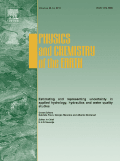
PHYSICS AND CHEMISTRY OF THE EARTH
Illuminating Earth's Processes through Collaborative ScienceThe Physics and Chemistry of the Earth is a premier interdisciplinary journal published by Pergamon-Elsevier Science Ltd, dedicated to advancing the understanding of Earth sciences through the integration of geophysical and geochemical perspectives. With an ISSN of 1474-7065 and an E-ISSN of 1873-5193, the journal serves as a critical platform for researchers and professionals to disseminate key findings and innovative methodologies in the realms of geophysics and petrology. As of 2023, it proudly holds a Q2 ranking in both Geochemistry and Petrology and Geophysics, reflecting its robust impact in the scientific community, with Scopus rankings that position it in the top 20% and 32% of its respective categories. Notably, the journal is available in an open-access format, allowing for greater dissemination and accessibility of research contributions. With a publication history spanning from 1992 to 2024, Physics and Chemistry of the Earth stands as a vital resource for ongoing research and discovery in the Earth sciences, making it an essential read for academics and practitioners alike.
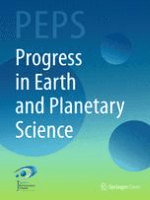
Progress in Earth and Planetary Science
Pioneering interdisciplinary collaboration in Earth sciences.Progress in Earth and Planetary Science is a premier open-access journal published by Springer, dedicated to advancing the field of Earth and planetary sciences. Since its inception in 2014, this journal has emerged as a prominent platform, achieving a Q1 ranking in the Earth and Planetary Sciences category, reflecting its high impact and rigorous peer-review process that ensures the highest quality of published research. With its broad scope encompassing diverse subfields within the Earth sciences, the journal aims to foster interdisciplinary collaboration and innovation among researchers, professionals, and students. The journal's commitment to accessibility through its open access model promotes the dissemination of knowledge globally, allowing critical research findings to be shared widely within the scientific community. Located in the United Kingdom, Progress in Earth and Planetary Science continues to play an essential role in shaping the future of Earth and planetary research from 2014 to 2024 and beyond.

Quaternary Science Advances
Unlocking the Secrets of Quaternary EnvironmentsQuaternary Science Advances, published by ELSEVIER, is a distinguished open access journal that has rapidly gained recognition in the fields of Earth and Planetary Sciences since its inception in 2020. With an impressive impact factor reflected by its Q2 ranking across various categories including Earth-Surface Processes and Geology, this journal serves as a vital platform for researchers and professionals aiming to advance the understanding of Quaternary environments and processes. Positioned within the 73rd percentile in Earth and Planetary Sciences and bolstered by a robust global readership, Quaternary Science Advances not only facilitates the dissemination of high-quality research but also encourages interdisciplinary collaboration. The journal’s open access model ensures that cutting-edge findings are readily available to students, researchers, and practitioners across the globe. With a commitment to promoting innovative studies from 2020 to 2024 and beyond, this journal remains a cornerstone for advancing knowledge within the dynamic landscape of Earth sciences.

BULLETIN OF GEOSCIENCES
Pioneering Insights in Earth and Planetary SciencesBULLETIN OF GEOSCIENCES, published by the prestigious Czech Geological Survey, stands as a pivotal resource in the fields of Earth and Planetary Sciences and Environmental Science. Since its inception in 2003, the journal has been committed to advancing knowledge through high-quality research, currently holding a commendable Q2 ranking in both disciplines. With its focus on diverse and innovative topics, BULLETIN OF GEOSCIENCES provides an essential platform for researchers, professionals, and students aiming to disseminate and access impactful studies. The journal is indexed in Scopus, ranking #78/195 in General Earth and Planetary Sciences and #110/233 in General Environmental Science, reflecting its significant contribution to academia. Publishing from Prague, Czech Republic, this journal invites contributions that illuminate the interactions between geological processes and environmental phenomena, ensuring an inclusive and accessible approach to crucial global issues.
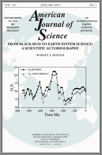
AMERICAN JOURNAL OF SCIENCE
Fostering Insights into Geological ProcessesThe American Journal of Science, published by the esteemed Amer Journal Science, stands as a leading platform for groundbreaking research in the field of Earth and Planetary Sciences. With an impressive impact factor and distinguished Scopus rank 34/195 in its category, the journal occupies a prestigious position in the academic community, reflecting its high-quality and influential contributions to scientific knowledge. The journal’s objective is to disseminate original research, comprehensive reviews, and critical discussions that advance our understanding of geological processes and planetary phenomena, supporting scholars and practitioners in their pursuit of knowledge. Despite its traditional publication structure, viewers can explore its rich repository of works dating from 1945 to present, offering a wealth of insights into the dynamic Earth sciences. The journal remains a vital resource for researchers, professionals, and students eager to engage with the latest scientific findings and foster further innovation in the field.

GEOLOGIA CROATICA
Unveiling Earth's Secrets for a Global AudienceGEOLOGIA CROATICA is a distinguished open-access journal published by the Croatian Geological Survey, dedicated to advancing the field of Earth and planetary sciences. Since its inception in 1992, this peer-reviewed journal has become an essential resource for researchers, professionals, and students interested in various aspects of geology. With its robust impact factor and a prestigious place in Scopus rankings, ranking 127th out of 321 in Geology and 77th out of 159 in miscellaneous Earth and Planetary Sciences as of 2023, GEOLOGIA CROATICA maintains a strong international presence. It provides a platform for the dissemination of critical research findings, promoting collaboration and knowledge sharing among the global scientific community. By focusing on high-quality manuscripts that cover geological processes, hazards, and resources, this journal is pivotal for anyone looking to contribute to or expand their understanding of geological sciences. The journal's commitment to open access ensures that invaluable research is accessible to all, fostering a more informed and scientifically engaged society.
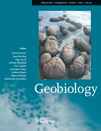
Geobiology
Fostering Dialogue on Climate Change and BiodiversityGeobiology, published by WILEY, is a prestigious journal at the forefront of interdisciplinary research in Earth and Planetary Sciences, Ecology, and Environmental Science. With an ISSN of 1472-4677 and an E-ISSN of 1472-4669, this journal has achieved remarkable recognition as evidenced by its Q1 categorization in multiple relevant fields, including Earth and Planetary Sciences, Ecology, and Environmental Science, according to the 2023 quartile rankings. Covering a diverse range of topics from biogeochemical cycles to the impacts of climate change on biodiversity, Geobiology serves as a vital platform for researchers, professionals, and students alike. The journal boasts impressive Scopus rankings, placing it within the top tiers of its fields, which is indicative of its significant influence and contribution to advancing knowledge. Although it does not operate under an Open Access model, Geobiology ensures widespread reach and accessibility, allowing for impactful dialogues within the scientific community. Researchers are encouraged to submit their findings and engage with cutting-edge studies to advance our understanding of the interplay between biological and geological processes.
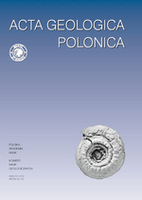
ACTA GEOLOGICA POLONICA
Advancing geological knowledge for a sustainable future.ACTA GEOLOGICA POLONICA is a distinguished journal published by the Polska Akademia Nauk, in collaboration with the University of Warsaw's Geology Department. Since its inception, it has served as a vital platform for disseminating innovative research in the field of Geology, reflecting a commitment to advancing scientific knowledge in Earth and planetary sciences. With an ISSN of 0001-5709 and an E-ISSN of 2300-1887, this journal provides a rigorous review process and is classified in the Q3 quartile for Geology as of 2023, indicating its growing influence in the discipline. Despite not being open access, the journal facilitates meaningful contributions that span a range of geological topics from fundamental research to applied sciences, thereby enriching the academic landscape. Researchers, professionals, and students alike are encouraged to engage with the valuable findings and discussions contained within its pages, which continue to shape the future of geological inquiry.

Geosfernye Issledovaniya-Geosphere Research
Empowering Early-Career Scholars in GeosciencesGeosfernye Issledovaniya-Geosphere Research, published by TOMSK STATE UNIVERSITY, is a significant addition to the scholarly discourse within the fields of Earth and Planetary Sciences, Ecology, and Geography. With a focus on innovative research and insights that span a broad spectrum of environmental and geographical studies, this journal aims to provide a platform for researchers and students alike to disseminate their findings and discuss pressing issues facing our planet. Though classified in the Q4 quartile for its 2023 metrics, it serves as an important venue for early-career scientists and scholars from the Russian Federation and beyond to contribute to the global dialogue surrounding geosciences. The journal operates with various access options, making it accessible to a diverse audience. It encourages submissions that inspire robust discussion and exploration of topics vital to our understanding of the geosphere and its intricate dynamics. Covering the pivotal years from 2019 to 2024, Geosfernye Issledovaniya-Geosphere Research is poised to enhance its relevancy and impact within the academic community.